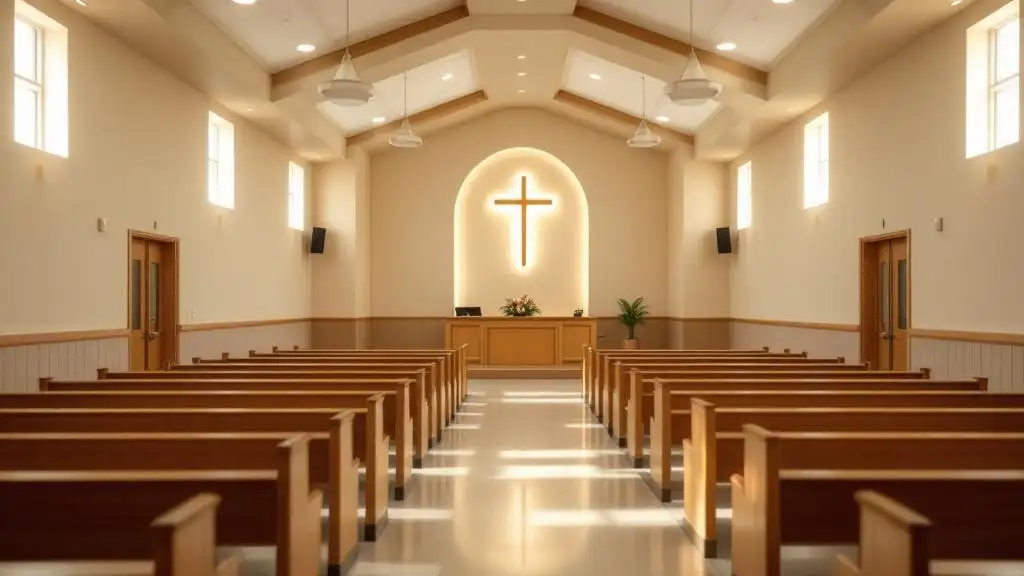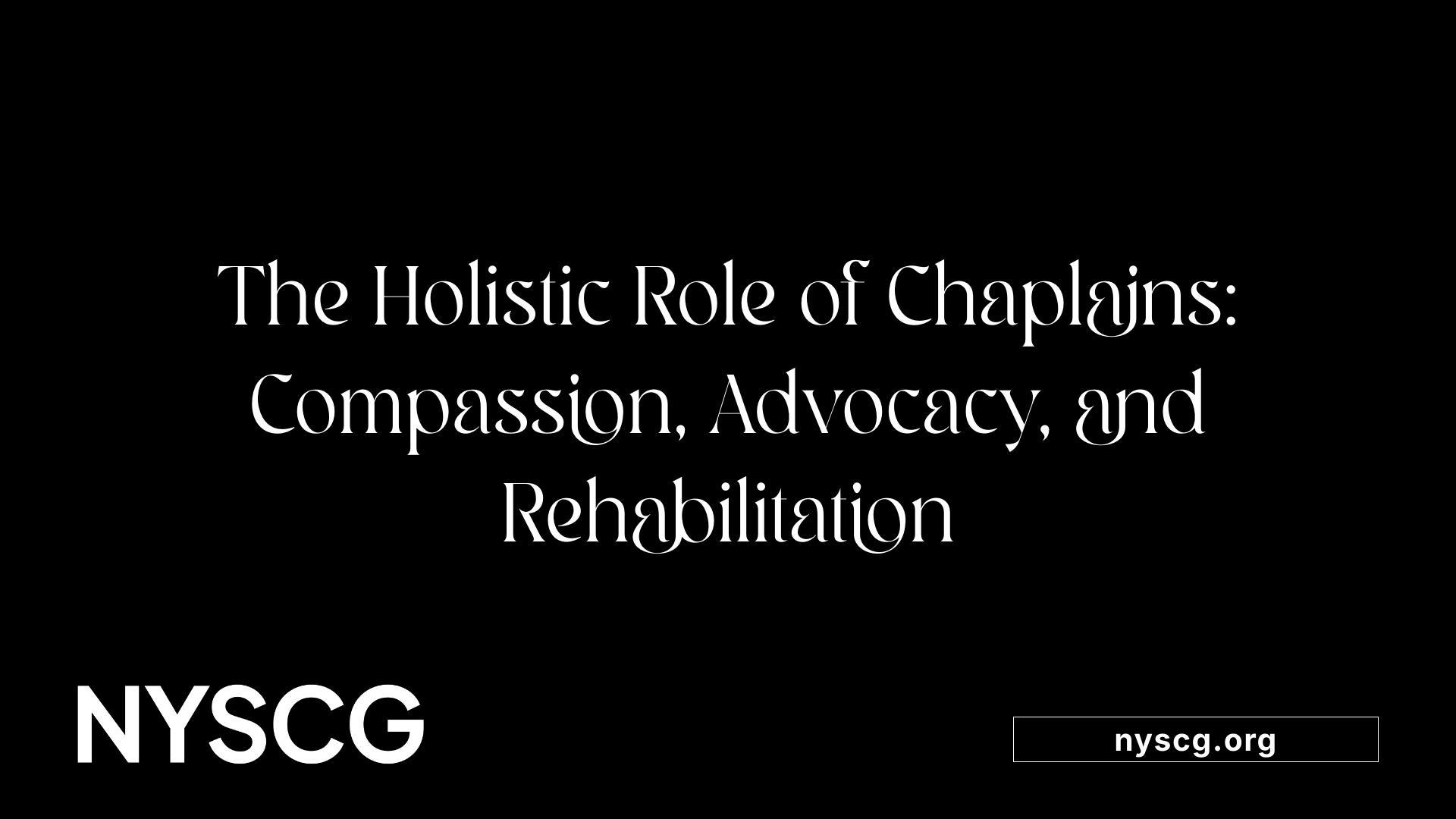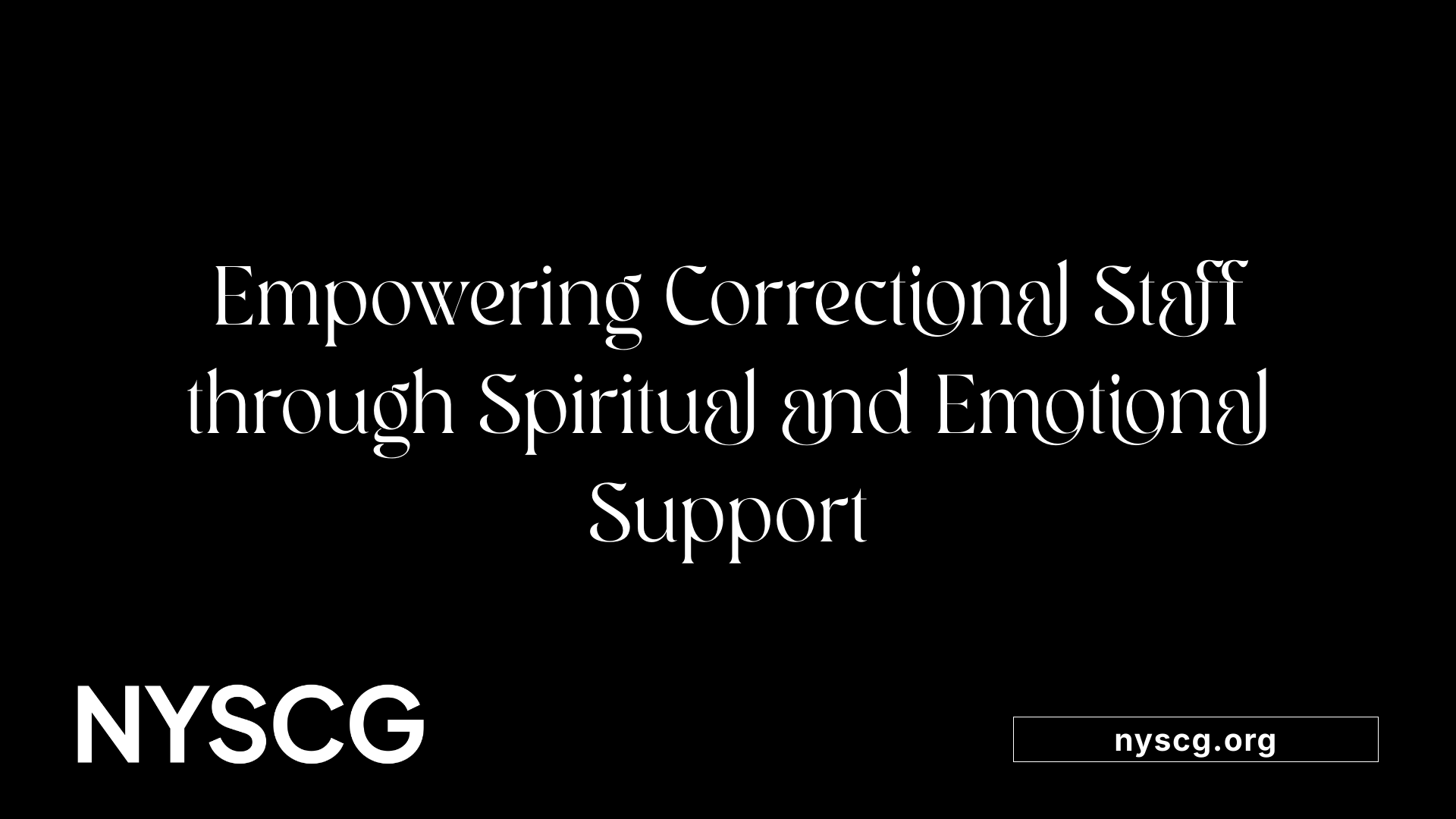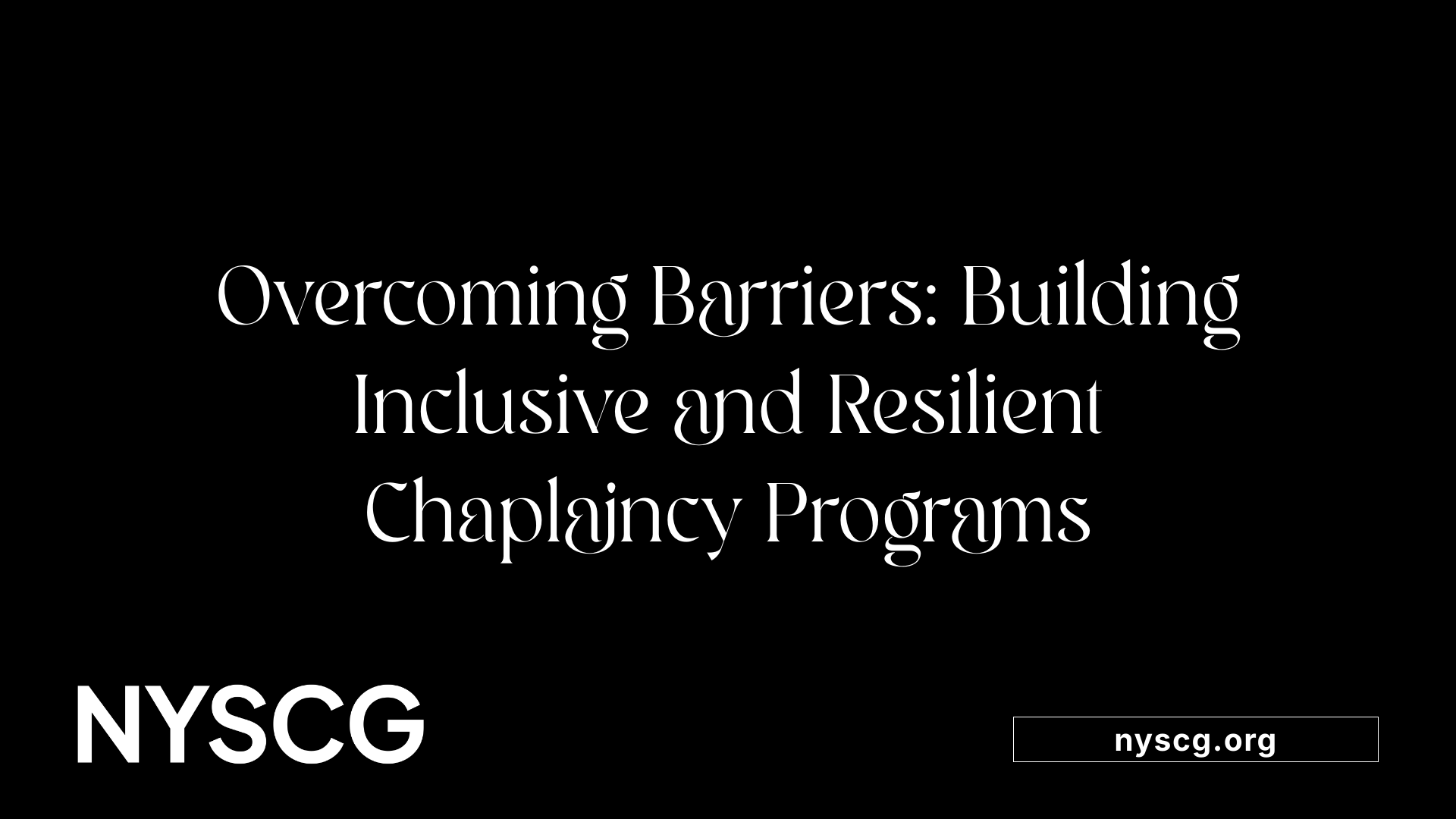How Chaplains Support Overworked Correctional Staff


Correctional staff face intense workloads, emotional stress, and health risks that can compromise their wellbeing and effectiveness. Recognizing their critical role, correctional facilities increasingly turn to chaplains—not only for inmate support but also as vital allies in staff wellbeing. This article explores how chaplains support overworked correctional personnel, the roles and responsibilities they undertake, and the strategies that make their support impactful.

Prison chaplains serve vital functions in correctional environments, primarily focusing on providing spiritual care and supporting the emotional well-being of inmates and staff. They conduct worship services, lead spiritual counseling sessions, and manage religious programs that cater to a variety of faith backgrounds. Their presence helps facilitate a sense of hope, purpose, and dignity among incarcerated individuals.
Beyond inmate support, chaplains actively support correctional staff by offering emotional and spiritual guidance, especially during stressful or traumatic incidents. They engage in individual conversations, lead prayer groups, organize faith-based activities like Bible studies or faith mentoring, and help staff navigate the emotional challenges of their roles.
A crucial part of their responsibilities involves advocating for inmates’ religious rights, ensuring access to spiritual resources, and promoting tolerance among different faith groups. They also advise correctional personnel about religious and cultural issues, supervise volunteers, and coordinate partnerships with external faith organizations. By acting as compassionate guides and advocates, chaplains contribute significantly to holistic rehabilitation, fostering an environment of respect and understanding.
Correctional chaplains undergo specialized training that encompasses pastoral care, religious instruction, and crisis management. Many are endorsed clergy members trained to serve in challenging environments, with ongoing education in areas such as cultural competency, trauma support, and ethical conduct.
Policies governing their work emphasize confidentiality, non-discrimination, and the respectful treatment of all inmates and staff regardless of faith or belief. These guidelines help ensure that chaplains can perform their duties ethically and effectively.
Their roles extend to administering religious sacraments, conducting worship services, and providing individual or group spiritual counseling. They also supervise and train volunteers, coordinate religious activities, and advise correctional staff on religious and cultural matters. Many chaplains participate in programs that aim to reduce recidivism, support mental health, and facilitate seamless reintegration into society after release.
Overall, these professionals act as spiritual anchors within the correctional setting, fostering hope and resilience while supporting the overarching goals of security, rehabilitation, and humane care.
Key ActivitiesDescriptionPercentage of Chaplains InvolvedAdditional NotesReligious servicesLeading worship, faith-based programs, and religious education93%Emphasizes faith community buildingPastoral counselingProviding emotional support and spiritual guidance during crises85%Supports mental health and stress reliefAdvising on religious issuesGuiding correctional staff and policy on religious matters92%Ensures religious rights are protectedSupervision of volunteersCoordinating volunteer efforts to expand religious programming91%Enhances program reach and community involvementAdministrative dutiesHandling paperwork, religious accommodation requests, and program logistics45%Crucial for smooth operationProgram organizationPlanning and executing faith-based activities like Bible studies and prayer groups69%Most time-intensive activityLeading religious instructionDirect spiritual teachings and pastoral training92%Core component of chaplain work
Chaplains serve as spiritual anchors inside correctional facilities, addressing the holistic needs of inmates, staff, and their families. They provide counseling to help inmates cope with stress, trauma, and the challenges of incarceration. By fostering spiritual growth and resilience, they facilitate rehabilitation, encourage positive behavioral changes, and support reintegration into society.
For staff, especially those overworked and stressed, chaplains offer a ministry of presence—listening, praying, and providing emotional relief. Initiatives like mindfulness exercises and faith-based trauma programs are designed to bolster correctional officers' mental health.
Their work extends beyond individual support. They organize faith-based programs, facilitate cross-faith dialogue, and advocate for prisoners' dignity and rights. These efforts aim to create safer, more respectful, and more humane correctional environments.
In summary, correctional chaplains contribute to the healing and transformation process, helping mend the spiritual and emotional fabric of correctional communities, and promoting a holistic approach to correctional care.

Chaplains play an essential role in helping correctional staff manage the psychological and spiritual challenges faced in correctional settings. They provide a confidential, supportive environment where staff can freely express concerns and seek guidance without judgment. This ministry of presence allows correctional personnel to unload stress and receive emotional reassurance.
Beyond listening, chaplains help staff develop practical coping mechanisms like stress management techniques, meditation, and encouraging self-care routines. These tools empower staff to handle workplace stressors such as long hours, safety concerns, and emotional exhaustion.
Spiritual guidance is also a core part of their support. Chaplains offer religious resources, prayer support, and spiritual counseling tailored to individual faith backgrounds, which can foster resilience, hope, and a sense of purpose. Such spiritual practices help staff find meaning amidst the hardships of correctional work.
In addition, chaplains facilitate open communication, help resolve conflicts, and promote inclusivity within the work environment. These activities reduce feelings of isolation and build a community of mutual support, ultimately improving mental health, job satisfaction, and emotional resilience among correctional personnel.
The impact of chaplaincy services in correctional facilities is substantial and multi-faceted. They serve as vital pillars of emotional and spiritual support for inmates, which significantly aids rehabilitation and reunification efforts. Faith-based programs led by chaplains, such as Bible studies, prayer groups, and mentoring, promote positive behavioral change, hope, and moral growth among prisoners.
Chaplains also advocate for inmates’ rights and dignity, ensuring access to spiritual resources and fostering an environment of respect. This advocacy and support help create a more humane and respectful correctional climate, aligned with international standards like the Nelson Mandela Rules.
Within the correctional setting, chaplains often act as mediators during conflicts, helping de-escalate tensions, and provide mental health support through counseling and crisis intervention. Their presence reduces violence and disruptive behaviors, contributing to safety for both inmates and staff.
Furthermore, the programs orchestrated by chaplains support the overall goal of reducing recidivism. By addressing spiritual and emotional needs, chaplains help inmates develop a sense of purpose and equip them with tools for successful reintegration into society.
Research indicates that chaplaincy services improve the atmosphere within correctional facilities, enhance inmates’ well-being, and support staff by reducing tensions and promoting healthier interactions. Their work underscores the importance of spirituality and holistic support in effective correctional management.
AspectImpactDetailsEmotional supportReduces stress and burnoutConfidential counseling, active listeningSpiritual guidanceFosters resilience and hopeFaith-based activities, prayer supportBehavior managementPromotes positive changeMoral development programs, mentorshipConflict resolutionMaintains safety and orderDe-escalation strategies, mediator rolesAdvocacy for dignityEnhances respect and human rightsEnsuring spiritual resource access, addressing discriminationRehabilitation supportAids reintegration into societyFaith-based mentoring, coping skills training
By integrating emotional, spiritual, and practical support, chaplains significantly contribute to safer, more respectful, and rehabilitative correctional environments, benefiting inmates, staff, and the wider community.

Chaplains working within correctional facilities encounter several obstacles that can limit their effectiveness in supporting correctional staff. A primary concern is staffing shortages, which can be exacerbated by strict security policies and limited resources. These shortages mean fewer chaplains are available to provide emotional, spiritual, and counseling services to overworked staff, increasing their stress and burnout.
Security policies, such as requiring chaplains to carry pepper spray, reflect institutional efforts to protect staff but also introduce conflicts. Some chaplains believe that carrying weapons contradicts their faith and professional principles, creating tension between security measures and religious or moral values. This inconsistency can impair the trust and rapport needed for effective support.
Diversity and inclusion issues pose additional challenges. The scarcity of Muslim chaplains in federal prisons illustrates a broader problem of insufficient representation of faith backgrounds, which can hinder access for some inmates and staff seeking spiritual guidance.
To address these issues, correctional institutions should prioritize recruiting a diverse body of chaplains that reflect the varied faiths within their populations. Offering training and support to chaplains on handling security restrictions while maintaining their spiritual mission is essential. Leveraging technology, such as virtual religious services and counseling sessions, can mitigate staffing shortages and increase access.
Furthermore, clear policies and collaborative efforts with faith-based organizations can improve the security and inclusivity of chaplaincy programs. Regular training on maintaining confidentiality, navigating institutional security concerns, and promoting cultural competence can enhance chaplains' capacity to serve effectively.
Overall, addressing these challenges involves a combination of increased staffing, policy revisions, diversity efforts, and innovative service delivery models—ensuring chaplains can provide meaningful support to correctional staff amidst ongoing security and resource constraints.
ChallengeImpactPotential SolutionsAdditional NotesStaffing shortagesLess support for staff well-beingRecruit more chaplains, utilize volunteers, expand spiritual services via technologyFocus on diversity and specialized trainingSecurity restrictionsConflict with faith principlesPolicy reviews, staff and chaplain training, faith-based security protocolsBalancing safety with spiritual integrityResource limitationsLimited programming and outreachIncreased funding, partnerships with faith organizations, community engagementIncorporate innovative delivery methodsDiversity gapsLimited access for minority faith groupsTargeted recruitment, cultural competence training, inclusive policiesEnhance representation of all faiths
By actively tackling these issues, correctional facilities can foster a more supportive environment for both inmates and staff, promoting a healthier, safer correctional setting.

Chapel services within correctional settings have proven to be highly impactful in supporting the mental, emotional, and spiritual needs of both inmates and staff. These services facilitate access to faith-based programs, counseling, and community-building activities, which are instrumental in promoting hope, moral development, and positive behavioral change among inmates.
For inmates, chaplains organize spiritual and faith-based activities such as Bible studies, prayer groups, and spiritual counseling. These programs help prisoners cope with the stresses related to incarceration, develop resilience, and foster a sense of purpose. As a result, these efforts contribute to reducing violence, de-escalating conflicts, and encouraging compliance with rules, thereby making the environment safer.
Chaplains also advocate for prisoner rights and dignity, ensuring access to religious resources and promoting tolerance within facilities. Their presence often helps build a respectful atmosphere compliant with international standards like the Nelson Mandela Rules, which emphasize humane treatment.
In addition, chaplains provide vital support to correctional staff. They offer emotional and spiritual guidance, helping staff manage stress, burnout, and the emotional toll of working in a challenging environment. Their counseling services and stress-management programs, such as spiritual retreats and peer support, contribute to improved staff morale and retention.
The integration of chaplaincy services has also shown to promote a more rehabilitative approach to corrections. By addressing the spiritual and emotional needs of inmates, chaplains help facilitate behavioral change and reduce recidivism. Their involvement in developing faith-based trauma programs and mentoring initiatives further supports prisoners' reintegration into society.
Research supports the positive impact of chaplaincy programs. Studies indicate that facilities with active chaplaincy services experience lower levels of violence, increased inmate cooperation, and improved staff well-being. This evidence underscores the importance of collaboration between chaplains, correctional staff, and community organizations.
Recognizing their contributions, some institutions are expanding chaplain services beyond inmate support to include correctional staff, creating holistic support systems that foster mental health, resilience, and a healthier correctional environment.
AspectImpactSupporting DataInmate rehabilitationPromotes moral development, reduces violence93% of chaplains lead religious programs, fostering positive changeStaff supportImproves morale, reduces burnout85% of chaplains provide counseling to staffCommunity integrationFacilitates reintegration, promotes tolerancePrograms include community outreach and interfaith activitiesSafety and securityHelps de-escalate conflictsChaplain programs are linked to reduced tensions
Overall, chaplaincy services in correctional environments are not merely religious programs but essential components of a comprehensive approach to correctional health, safety, and rehabilitation. Their effectiveness is supported by ongoing research and practical outcomes, emphasizing the need for continued collaboration and integration within correctional support systems.
Integrating chaplaincy services into correctional institutions is a vital step toward creating a more humane and resilient environment. By addressing the needs of both inmates and staff, chaplains contribute not only to spiritual and emotional wellbeing but also to safer and more effective correctional operations. Overcoming challenges through strategic policy, diversity, and resource investment will ensure that chaplaincy continues to be a cornerstone of support in correctional facilities, ultimately fostering hope, dignity, and resilience for everyone.
All you need is the will to make the world a better place.
New York State chaplain group inc. is a tax deductible organization with a federal tax Id number 92-383-4921